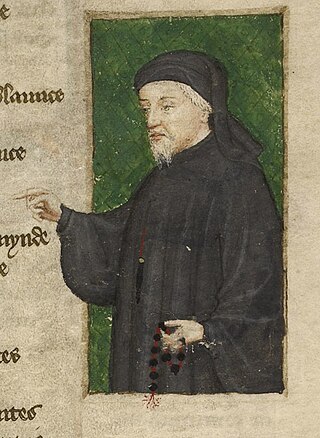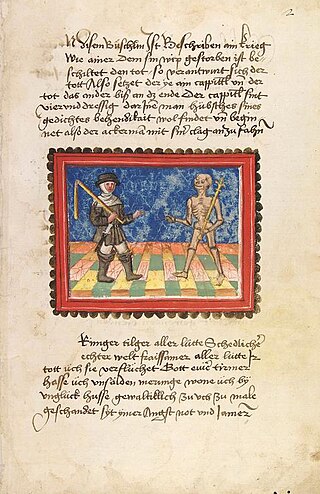
Geoffrey Chaucer was an English poet, author, and civil servant best known for The Canterbury Tales. He has been called the "father of English literature", or, alternatively, the "father of English poetry". He was the first writer to be buried in what has since come to be called Poets' Corner, in Westminster Abbey. Chaucer also gained fame as a philosopher and astronomer, composing the scientific A Treatise on the Astrolabe for his 10-year-old son, Lewis. He maintained a career in the civil service as a bureaucrat, courtier, diplomat, and member of parliament.

Lammas, also known as Loaf Mass Day, is a Christian holiday celebrated in some English-speaking countries in the Northern Hemisphere on 1 August. The name originates from the word "loaf" in reference to bread and "Mass" in reference to the Eucharist. It is a festival in the liturgical calendar to mark the blessing of the First Fruits of harvest, with a loaf of bread being brought to the church for this purpose. Lammastide falls at the halfway point between the summer solstice and the autumn equinox. Christians also have church processions to bakeries, where those working therein are blessed by Christian clergy.

A plough or (US) plow is a farm tool for loosening or turning the soil before sowing seed or planting. Ploughs were traditionally drawn by oxen and horses but modern ploughs are drawn by tractors. A plough may have a wooden, iron or steel frame with a blade attached to cut and loosen the soil. It has been fundamental to farming for most of history. The earliest ploughs had no wheels; such a plough was known to the Romans as an aratrum. Celtic peoples first came to use wheeled ploughs in the Roman era.

Tages was claimed as a founding prophet of Etruscan religion who is known from reports by Latin authors of the late Roman Republic and Roman Empire. He revealed a cosmic view of divinity and correct methods of ascertaining divine will concerning events of public interest. Such divination was undertaken in Roman society by priestly officials called haruspices.

Hu Gadarn is a supposed Welsh legendary figure who appears in several of a series of Welsh Triads produced by the Welsh antiquarian and literary forger Iolo Morganwg. These triads, which Iolo put forth as medieval works, present Hu as a culture hero of the ancient Britons who introduced ploughing. However, it is now known that the triads, like all of the so-called "Third Series" of triads, were fabricated by Iolo himself. The name "Hu Gadarn" earlier appeared in a Welsh translation of a French romance about Charlemagne. Still, Iolo's version of Hu Gadarn was taken up in the 20th century by the poet Robert Graves, who associated him with other Celtic figures; since then he has been popular among neopagans.

Piers Plowman or Visio Willelmi de Petro Ploughman is a Middle English allegorical narrative poem by William Langland. It is written in un-rhymed, alliterative verse divided into sections called passus.
Godspeed is a parting statement, wishing someone a prosperous journey or success.

Conduit current collection is an obsolete system that was used by some electric tramways to pass current to streetcars via a "conduit", a small tunnel under the roadway. Modern systems fall under the term ground-level power supply.

Speed-the-Plow is a 1988 play by David Mamet that is a satirical dissection of the American movie business. As stated in The Producer's Perspective, "this is a theme Mamet would revisit in his later films Wag the Dog (1997) and State and Main (2000)". As quoted in The Producer's Perspective, Jack Kroll of Newsweek described Speed-the-Plow as "another tone poem by our nation's foremost master of the language of moral epilepsy."

, Libussa, Libushe or, historically Lubossa, is a legendary ancestor of the Přemyslid dynasty and the Czech people as a whole. According to legend, she was the youngest but wisest of three sisters, who became queen after their father died; she married a ploughman, Přemysl, with whom she founded the Přemyslid dynasty, and prophesied and founded the city of Prague in the 8th century.

Pierce the Ploughman's Crede is a medieval alliterative poem of 855 lines, lampooning the four orders of friars.
Koinonia, communion, or fellowship in Christianity is the bond uniting Christians as individuals and groups with each other and with Jesus Christ. It refers to group cohesiveness among Christians.
The Piers Plowman tradition is made up of about 14 different poetic and prose works from about the time of John Ball and the Peasants Revolt of 1381 through the reign of Elizabeth I and beyond. All the works feature one or more characters, typically Piers, from William Langland's poem Piers Plowman. Because the Plowman appears in the General Prologue to The Canterbury Tales by Geoffrey Chaucer but does not have his own tale, plowman tales are sometimes used as additions to The Canterbury Tales, or otherwise conflated or associated with Chaucer.

Earth's Answer is a poem by William Blake within his larger collection called Songs of Innocence and of Experience. It is the response to the previous poem in The Songs of Experience-- Introduction . In the Introduction, the bard asks the Earth to wake up and claim ownership. In this poem, the feminine Earth responds.

Der Ackermann aus Böhmen, also known as Der Ackermann und der Tod, is a work of prose in Early New High German by Johannes von Tepl, written around 1401. Sixteen manuscripts and seventeen early printed editions are preserved; the earliest printed version dates to 1460 and is one of the two earliest printed books in German. It is remarkable for the high level of its language and vocabulary and is considered one of the most important works of late medieval German literature.

In Norse mythology, Gefjon is a goddess associated with ploughing, the Danish island of Zealand, the legendary Swedish king Gylfi, the legendary Danish king Skjöldr, foreknowledge, her oxen children, and virginity. Gefjon is attested in the Poetic Edda, compiled in the 13th century from earlier traditional sources; the Prose Edda and Heimskringla, written in the 13th century by Snorri Sturluson; in the works of skalds; and appears as a gloss for various Greco-Roman goddesses in some Old Norse translations of Latin works.

"We Plough the Fields and Scatter" is a hymn of German origin commonly associated with harvest festival. Written by poet Matthias Claudius, "Wir pflügen und wir streuen" was published in 1782 and set to music in 1800 attributed to Johann A. P. Schulz. It was translated into English by Jane Montgomery Campbell in 1861. It appears in a shortened form in the musical Godspell, as the song, "All Good Gifts". It is among the most performed of hymns in the United Kingdom.
"All Jolly Fellows that Follow the Plough" or The Ploughman's Song is an English folk song about the working life of horsemen on an English farm in the days before petrol-driven machinery. Variants have been collected from many traditional singers - Cecil Sharp observed that "almost every singer knows it: the bad singers often know but little else". It has been recorded by many singers influenced by the second British folk revival.
"Y Llafurwr", known in English as "The Ploughman" or "The Labourer", is a poem in the form of a cywydd by the 14th-century Welsh poet Iolo Goch. Often compared with William Langland's Middle English Piers Plowman, it presents a sympathetic portrayal of the meek and godly ploughman; no other Welsh bardic poem takes an ordinary working man as its subject. It has been called the most notable of Iolo's poems, comparable with the finest works of Dafydd ap Gwilym, and its popularity in the Middle Ages can be judged from the fact that it survives in seventy-five manuscripts. It is included in The Oxford Book of Welsh Verse.
The plowboy trope appears in Christian rhetoric and literature in the form of various bucolic, lowly, pious or even unsavoury characters who would benefit from being exposed to Scripture in the vernacular. The plowboy trope is an anti-elitist trope dating back at least 1600 years.













